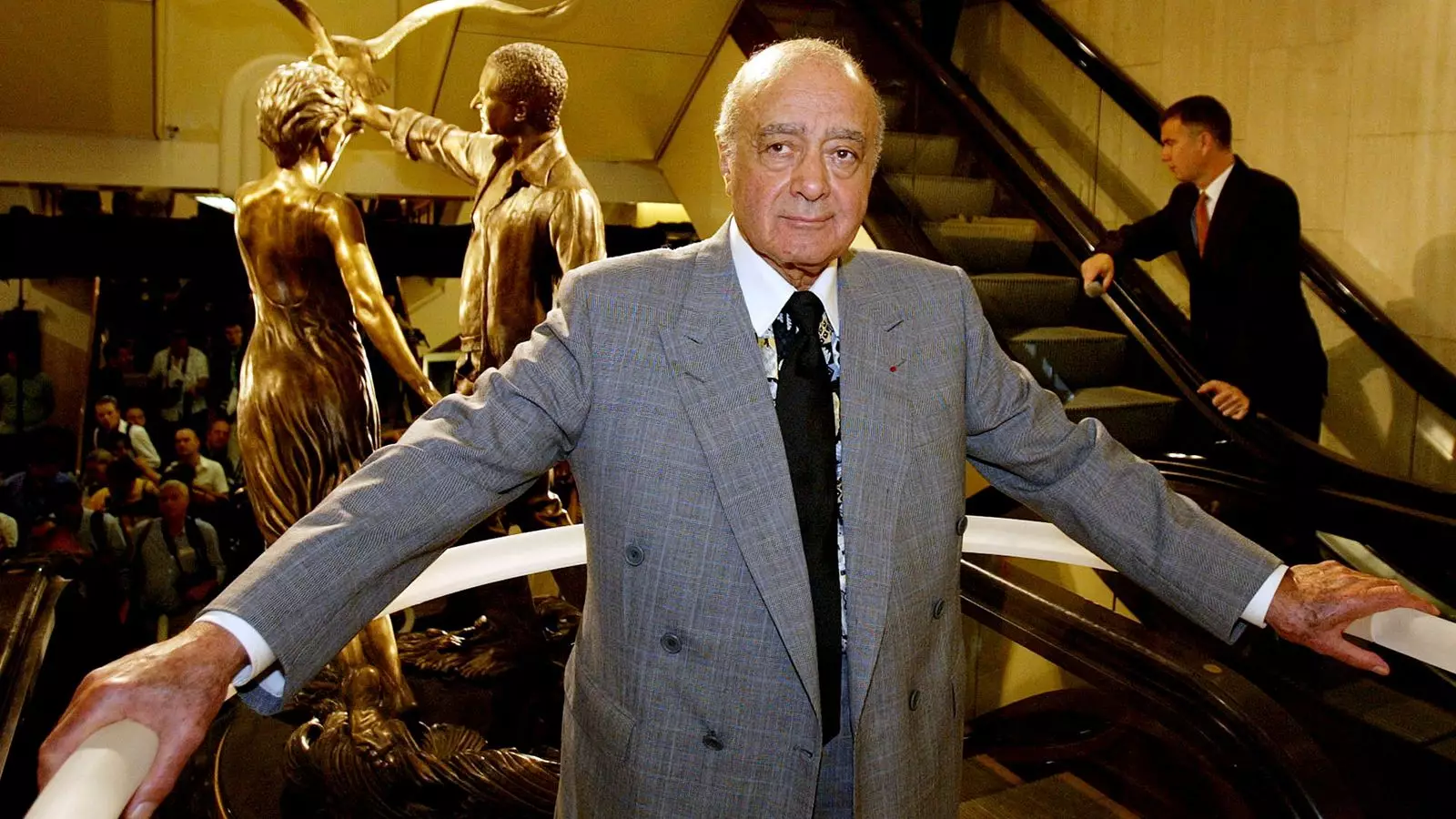Recent testimonies surrounding the late Mohamed Al Fayed, former owner of the prestigious Harrods department store, depict a harrowing narrative of alleged abuse and exploitation. Characterized as a “predator” by one of his alleged victims, the revelations have ignited a broader discussion about systemic failings within corporate structures designed to protect employees. The claims made by Dean Armstrong KC, the attorney representing alleged victims, draw unsettling parallels to notorious figures such as Jimmy Savile and Jeffrey Epstein. This alarming comparison underscores the gravity of the situation, hinting at a deeply embedded culture of complicity and disregard for vulnerable individuals.
Al Fayed’s tumultuous legacy spans decades and includes not only his stewardship of Harrods but also his ventures in the hospitality and sports industries. However, these substantial achievements are now being overshadowed by allegations from more than 20 former female employees who have stepped forward, recounting their traumatic experiences within the plush walls of Harrods. The fact that many of these women were in their late teens or even younger when they entered employment at Harrods raises critical questions about the ethics of hiring practices and corporate responsibility.
Among the accounts is that of Natacha, who, at just 19 years old, found herself in a precarious situation after moving to London. Describing herself as “young, naive, and totally innocent,” she recounted her traumatic experience of allegedly fighting off Al Fayed’s advances in his private office. The bravery of such individuals in coming forward after years of silence signifies not only their quest for justice but also offers a lifeline to others who may have endured similar experiences in silence.
Adding to this complexity, reports indicate that several women have accused Al Fayed of rape. These allegations are deeply disturbing, creating an urgent need for both corporate and legal entities to reassess their protocols surrounding allegations of sexual misconduct. In particular, the legal team representing these women has pointed to Harrods’ failure to create a safe workspace, which they argue constitutes a gross violation of employee rights and corporate duty.
The case against Al Fayed also highlights the critical need for companies to uphold a rigorous framework for accountability. According to the legal representatives involved in the civil suit against Harrods, the systemic failures witnessed during Al Fayed’s tenure as owner exemplify an “abject failure of corporate responsibility.” They argue that Harrods, as an entity, must confront its past and take accountability for failing its employees, particularly during an era when such behaviors were often swept under the rug.
Statements from Harrods express great dismay over the allegations, portraying a stark contrast between the organization’s current ethos and its past under Al Fayed’s leadership. The department store has emphasized its commitment to ensuring the welfare of its employees. However, questions remain regarding the effectiveness of these measures and whether they can genuinely facilitate healing for those harmed or prevent similar occurrences in the future.
This unfolding narrative has also elicited strong reactions from various quarters, notably from public figures, activists, and advocacy groups. The allegations against Al Fayed and the subsequent acknowledgment of systemic failings resonate deeply with ongoing societal conversations about sexual abuse and exploitation in various industries. Many listeners are drawing parallels to the #MeToo movement, which has galvanized broader discussions around the need for institutional accountability and ethical conduct.
The involvement of the police, while a necessary step, emphasizes the crucial intersection of corporate practices and law enforcement in tackling such issues of abuse. Metropolitan Police Commander Kevin Southworth indicated ongoing investigations into the allegations against Al Fayed, signaling a commitment to addressing historical injustices. Yet, the challenge lies in effectively navigating the complex landscape of past decisions and failed protocols.
As Harrods moves forward, the task at hand involves more than just legal reparations; it requires a cultural shift rooted in genuine empathy and accountability. The revelation of Al Fayed’s actions presents an opportunity for reflection within corporate entities on their own practices and employee treatment. Establishing an environment where individuals can report misconduct without fear of reprisal should be a priority not only at Harrods but across the board in all workplaces.
In concluding, the dark legacy of Mohamed Al Fayed serves as a pivotal case study on the necessity of safeguarding vulnerable individuals within any corporate structure. The ongoing discussions catalyzed by these allegations should push society towards fostering a culture of transparency, where individuals can feel safe, respected, and protected. As more voices join the chorus calling for justice, it becomes evident that the fight against systemic abuse is far more than a legal battle; it’s a societal mandate to uphold dignity and integrity across all aspects of life.

Leave a Reply